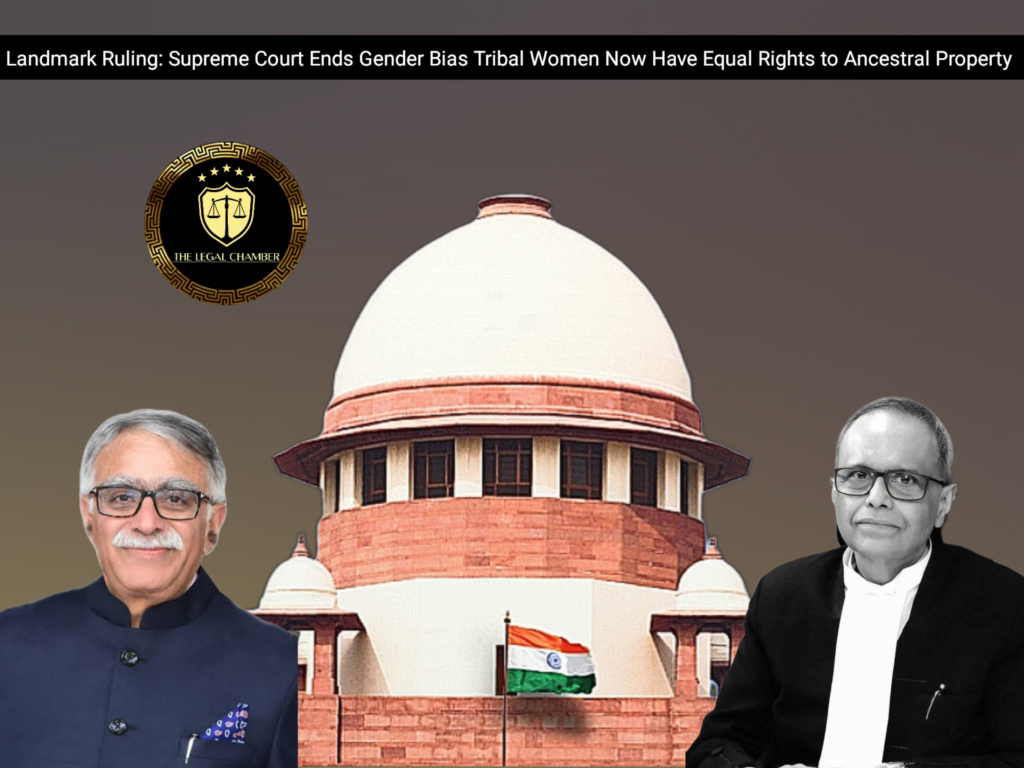
The Supreme Court ruled that in the absence of any established custom or law governing inheritance for Scheduled Tribes, the principles of justice, equity, and good conscience under Section 6 of the Central Provinces Laws Act, 1875 must apply. The Court held that denying tribal women equal inheritance rights violates Article 14 (right to equality) of the Constitution, as discrimination based on gender lacks a rational nexus. The judgment overruled the lower courts’ dismissal of the claim, affirming that legal heirs of tribal women are entitled to an equal share in ancestral property unless a contrary custom is proven.
Facts Of The Case:
The case involved a dispute over the inheritance rights of a tribal woman, Dhaiya, belonging to the Gond Scheduled Tribe in Chhattisgarh. The appellants, Dhaiya’s legal heirs, sought partition of her father Bhajju’s property, claiming she was entitled to an equal share alongside her five brothers. The suit was initially dismissed by the Trial Court (2008) and First Appellate Court (2009), which held that since Scheduled Tribes are excluded from the Hindu Succession Act, 1956, the plaintiffs failed to prove any customary right granting daughters inheritance. The High Court (2022) upheld this, stating no evidence established such a custom.On appeal, the Supreme Court examined whether tribal women could be denied inheritance solely due to the absence of a custom. The appellants argued that in the absence of specific tribal laws, principles of justice, equity, and good conscience (under Section 6 of the Central Provinces Laws Act, 1875) should apply. The Court agreed, holding that presuming exclusion of women without proof of discriminatory customs was unconstitutional under Article 14. It emphasized that gender equality is a constitutional mandate and overturned the lower courts’ rulings, granting Dhaiya’s heirs an equal share in the ancestral property. The judgment reaffirmed that silence in custom cannot justify discrimination against tribal women.
Procedural History:
The case originated in 2008 when the appellants filed a civil suit before the Second Civil Judge, Class-2, Surajpur, seeking partition of ancestral property, which was dismissed on the grounds that the plaintiffs failed to prove any customary right of tribal women to inherit property. The First Additional District Judge (FTC), Surajpur, upheld this decision in 2009 in Civil Appeal No. 1A/08, concurring that no evidence supported inheritance rights for daughters under tribal customs. The appellants then approached the Chhattisgarh High Court through a Second Appeal (No. 465 of 2009) under Section 100 of the CPC, which was admitted on a substantial question of law but ultimately dismissed in 2022, affirming the lower courts’ findings. The matter reached the Supreme Court through a Special Leave Petition (SLP(C) No. 5559 of 2023), converted into Civil Appeal No. 9537 of 2025, where the Court reversed the earlier judgments, ruling in favor of gender equality and applying principles of justice, equity, and good conscience under the Central Provinces Laws Act, 1875. The SC’s 2025 judgment settled the legal position on tribal women’s inheritance rights.
READ ALSO:Supreme Court Clarifies When Courts Can Summon New Accused During Trial Section 319 CrPC
Court Observation:
The Supreme Court made several critical observations in its landmark judgment. It noted that the lower courts erred in presuming an exclusionary custom against tribal women inheriting property without requiring the defendants to prove such a discriminatory practice. The Court emphasized that in the absence of any established tribal custom or law governing inheritance, the principle of “justice, equity and good conscience” under Section 6 of the Central Provinces Laws Act, 1875 must apply. It held that denying inheritance rights to tribal women solely based on gender violates Article 14 of the Constitution, as such discrimination lacks any reasonable classification or rational nexus with a legitimate objective. The Court further observed that customs cannot remain static and must evolve with constitutional values of equality and non-discrimination. Significantly, it ruled that when customs are silent on inheritance rights, courts must interpret them in a manner that promotes gender justice rather than perpetuating patriarchal norms. The judgment also clarified that the repeal of the 1875 Act did not affect accrued rights, allowing the application of its equitable principles to the present case. These observations collectively established that tribal women have equal rights to ancestral property unless a contrary custom is explicitly proven.
Final Decision & Judgement:
In its final decision, the Supreme Court allowed the appeal and set aside the judgments of the Trial Court, First Appellate Court, and High Court. The Court held that Dhaiya’s legal heirs (the appellants) were entitled to an equal share in their maternal grandfather’s ancestral property, on par with male heirs. The judgment established that in the absence of any proven custom excluding tribal women from inheritance, the principles of justice, equity, and good conscience must prevail, ensuring gender equality under Article 14 of the Constitution. The Court emphasized that silence in custom cannot justify discrimination and ruled that unless a tribal community specifically demonstrates an exclusionary practice through evidence, daughters must be treated equally in matters of succession. The landmark decision not only granted relief to the appellants but also set a progressive precedent for gender-just inheritance rights across tribal communities in India, aligning customary practices with constitutional values. No costs were awarded, and all pending applications, if any, were disposed of accordingly.
Case Details:
Case Title: Ram Charan & Ors. vs. Sukhram & Ors. Citation: 2025 INSC 865 Appeal No.: Civil Appeal No. 9537 of 2025 Date of Judgment: July 17, 2025 Bench:Justice Sanjay Karol & Justice Joymalya Bagchi
Download The Judgement Here